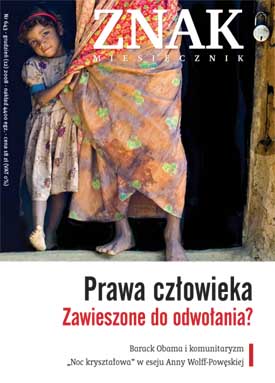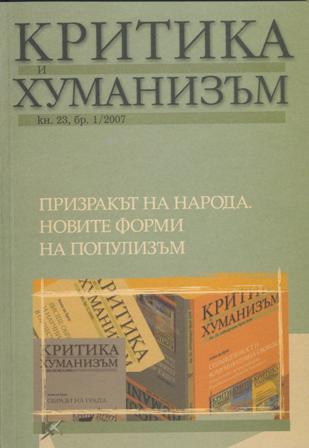


Keywords: Boże Narodzenie; Christmas; zwyczaje świąteczne; święta w świecie; Azja; Afryka; obyczaje
More...
Keywords: gospel; gospel music in Poland; muzyka gospel w Polsce; przekład; tłumaczenie; Niech wolność rozbrzmiewa; Let Freedom Ring; Nadzieja moja; My Hope Is Built; Wytrwaj; Hold On; Jezus jest skałą na znużonej ziemi; Martin Luther King
More...
Keywords: antysemityzm; anti-Semitism; Jews; Catholics and Jews; Benedict XI; pope; papież; Benedykt XVI; papież o judaizmie; katolicy i żydzi; dialog katolicko-żydowski
More...
Keywords: gospel; muzyka gospel; gospel music; muzyka gospel w Polsce; gospel music in Poland
More...
Keywords: George Bush; Stany Zjednoczone; United States; Barack Obama;
More...
Keywords: prawa człowiekal; human rights; historia; history; International Law; prawo międzynarodowe
More...
Keywords: populism; comparative; political parties; ideology; liberal centrism; nationalism
I would like to speak briefly about the rise of populism in Europe, comparing Western Europe with Central and Eastern Europe, giving attention both to political parties and ideology. I would also like to add some comparison with populism in South America. Let us start not with a definition of populism but the idea that the core ideological appeal of populism is as an alternative to consensus-oriented liberal centrism. The political evolution of Western European political parties in the second half of the 20th century was obviously towards consensus-oriented liberal centrism. It brought with it at all times the possibility or risk of attack on the system from either side. Populism is ideologically eclectic and can find an entry point either from the left or the right.
More...
Keywords: banality; populism; extremism; democracy; danger; equality; militant democracy
No matter how we define populism, we should mention one of its basic assumptions: that the will of the people should be fully represented in the political process. The will of the people should not be frustrated, disregarded or reinterpreted by representatives and intermediaries. When we take into account this basic assumption, it seems that populism is the political ideal of adequate and full representation of the people – and in our analysis we should take into account this kind of normative claim. But when we take it into account, it becomes apparent that if we ask the question of whether populism is dangerous or not, we will get very contextual answers because this depends very much on the will of the people in a particular political environment and in a particular society.
More...
Keywords: populism; politics; political populism; idealisation
The purpose of this text is to propose several theses on populism in Bulgaria today. The Bulgarian political debate seems obsessed with the subject. Hence, the need to elucidate the phenomenon of populism in Bulgaria is obvious and does not require justification. To achieve my goal, I will use the tools of political theory and its history rather than the much more commonly applied approaches to populism from the perspective of sociology, comparative political studies, transitology studies, etc.
More...
Keywords: politics; populism; populist movements; liberal democracy; political culture; nationalism
In February 1989 I gave a talk at the IWM in Vienna which was entitled ‘After Communism, What?’ Its main thesis was that the crumbling of communism in East-Central Europe brings with it the prospect of democratic change but that its success will depend on the new balance found between the democratic ethos of opposition to totalitarianism and the resurfacing of deeper undercurrents of the region’s political culture. Just as the term ‘return to Europe’ was ambiguous, so the term ‘return of democracy’ was problematic for anybody who had studied pre-communist politics of East-Central Europe. The test case, I thought, would be Poland, and I had ventured the following proposition: The mix of Catholicism and nationalism that prevailed in Polish society had made it particularly resistant to communism (certainly in comparison with the egalitarian, social-democratic ethos of the legacy of Masaryk’s pre-war Czechoslovakia).
More...
Keywords: populism; parties of negation; democracy; demagogy; charisma
There is a poem by the famous Austrian poet Ernst Jandl that can be used as a summary of all populist political appeals. The poem is called ‘Answers to Seven Unasked Questions’ and goes like this: ‘No / No / No / No / No / No / No’. My (not particularly original) thesis is that populist parties are, above all, parties of negation and that the moment they enter government they lose much of their energy and persuasiveness. I will try to illustrate this with somewhat unsystematic observations on the common aspects of populist parties and their development after they enter government. I will also offer a few remarks on populism in Germany, where I live.
More...
Keywords: press; politics; populism; people; public; nation; ethnic group
The rhetoric born of the French Revolution and the new concepts of popular sovereignty, public opinion and the rights of the people played an important role in the formation of modern Bulgarian political culture. The purpose of this text is to trace the ways in which the power-holders in the Principality of Bulgaria strove to legitimate their power through ‘the people’ in the 1880s and 1890s. It will try to describe the struggle in the public political sphere as a contest for the right to interpret and represent the ‘will of the people’. The different uses, senses and meanings of the term ‘people’ in the Bulgarian public political sphere in the period under review will be sought and revealed.
More...
Keywords: populism; legacy; socialism; totalitarian rejime; anti-individualism; ideology
Why is not voting a shameful thing? One of the few points of consensus that have emerged in the Bulgarian public sphere in the last fifteen years or so is that voting in elections is something good in principle, while non-voting is a sign of civic immaturity, social autism or plain indifference and cannot be a valid, publicly defensible position. Why is distancing oneself from the political a bad thing, while the childish enthusiasm that can bring to power a king or a general is considered to be something entirely acceptable? Why do even Ataka’s critics insist on pointing out that Ataka’s electorate must be treated with respect?
More...
Keywords: interview; populism; post-populism; contemporary myth; politics; democracy; simplification
Boyan Znepolski interviews Michel Wieviorka Boyan Znepolski: Populism is a term used quite often these days. Sometimes it is even misused. At the same time, populism is a ‘slippery’ term whose meaning remains vague. It is used either as a synonym for demagogy or in association with nationalism – as in the phrase ‘national populism’. What is your definition of populism? What is its significance in contemporary social sciences? Michel Wieviorka: It is very difficult to give a satisfactory definition of populism because the term has different historical meanings, it refers to different historical experiences in different parts of the world and therefore seems to elude definition. And then, while the term has recently acquired quite negative, denigrating connotations, it may also have much more positive meaning.
More...
Keywords: populism; national populism; crisis; democracy; nationalism; patriotism; liberalism
The phenomenon of new populism has been the subject of many studies and analyses in recent years. Despite the great variety of approaches, their purpose may be summed up as follows: defining populism and its main forms, identifying the new forms of populism in the contemporary world, and analysing the specific risks posed by populism today.
More...
Keywords: populism; nationalism; political protest; presidental elections; anti-minorities rethoric
On 26 November 2000 Corneliu Vadim Tudor took everyone by surprise when he won more than a quarter (28.3%) of the vote in the first round of the Romanian presidential elections. Having made it to the runoff, the leader of the political party România Mare (Partidul România Mare, PRM, Greater Romania Party), who entered politics in 1991, scored his biggest win to date (33%). In the subsequent parliamentary elections his nationalist party polled 20% of the vote. Incapable of repeating their 2000 success, România Mare and its leader have since managed to retain the support of around 13% of the electorate by embodying the aspirations of national pride combined with an authoritative presence of the nanny state. Five years later, in June 2005, Bulgaria likewise saw a nationalist vote: Ataka, a party created two months before the parliamentary elections, won 8.93% of the vote and twenty-one out of a total 240 seats in parliament. The emergence of this radical xenophobic party provoked a huge outcry from the public and the political class, with some MPs even calling for a boycott against the elected nationalists. Even so, in the October 2006 presidential elections Volen Siderov, the leader of Ataka, made it to the runoff owing to the absence of a credible political alternative to the outgoing president, Socialist Georgi Parvanov. Securing 24.05% of the vote (just 3% more than in the first round), the xenophobe tribunician seemed to have reached his limit – which is only half good news.
More...
Keywords: populism; demicratic liberalism; elite; people,social inequality; politics
‘A spectre is haunting the world: populism. A decade ago, when the new nations were emerging into independence, the question that was asked was, how many will go communist? Today, this question, so plausible then, sounds a little out of date. In as far as the rulers of the new states embrace an ideology, it tends more to have a populist character.’ This observation was made by Ghita Ionescu and Ernest Gellner exactly forty years ago. A time long enough for ‘populism’ first to disappear and then to re-emerge as the major player in global politics. And now, like then, there can be no doubt about the importance of populism. But now, like then, no one is clear about exactly what it is. Is there one phenomenon corresponding to this one name?
More...
Keywords: historicisation; populism; history; official culture; anniversary; national; narratives; totalitarian rejime
In the sources on which this study is based, the first high-level mention of the 1,300th anniversary of the foundation of the Bulgarian State (in 1981) is found in a statement made at the July 1968 plenum of the Central Committee (CC) of the Bulgarian Communist Party (BCP) in connection with a resolution of the Politburo of the CC of the BCP on the writing and publication of a multi-volume history of Bulgaria. By that time professional discourse about the past had begun to emancipate itself from the ideological discourse, a process that would continue in the years to come. The late sixties also saw changes in the mode of sharing and articulation in public of the ‘historical’ truth that had been valid in the previous two decades; in a way, the dominant ideology adjusted itself to the ‘new discourse’ on history, gradually assuming responsibility for ‘Bulgaria’s entire past’.
More...
Keywords: politics; reform; moral revolution; liberal; collusion; right; populism; lustration
Jarosław Kaczyński, speaking at a rally of his supporters on November 1 2006 at the Gdańsk Shipyard, the cradle of the Solidarity movement twenty-five years ago, said that ‘we stay where we stood then, while they stay where the ZOMO stood.’ By ‘we’ he meant his party, Law and Justice (PiS), and the government he heads, and by ‘they’ – all those who are his opponents. ZOMO, of course, is the acronym of the infamous communist riot police, one of the symbols of martial law introduced in 1981 to suppress Solidarity. Kaczyński’s statement provoked cries of protest from many of the former anti-communist opposition members who now disagree with the PiS and who thought Kaczyński had gone too far, but that did not seem to detract him. In fact, he specialises in using strong words and categorical judgements to describe and attack his opponents, and his close collaborators follow with zeal.
More...